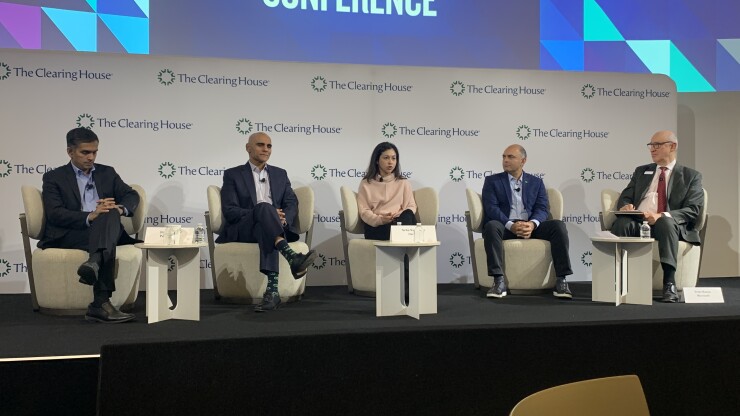
The introduction of tools powered by generative artificial intelligence has created a bit of fervor in the financial services space, as institutions engaged with more established AI products begin exploring the capabilities and vulnerabilities associated with the new technology.
Banks have deployed
Last Thursday, speakers on a panel discussion at The Clearing House's annual conference in New York offered insights into the roles that both traditional and generative AI play in the evolution of the banking and payments industries while discussing the challenges facing organizations struggling to determine where it can be used best.
Starting with the customer experience from start to finish, rather than focusing on the utility of various AI tools themselves, can help identify friction points and shape the early stages of innovation, explained Hari Gopalkrishnan, head of consumer, business and wealth management technology for Bank of America.
"From the moment the client starts with us, all the way through our channels to our products to operations to data to regulatory reporting, we stitch that together and now that we know what that journey looks like, how do we make it as effective as it possibly can be for us and our customers," Gopalkrishnan said.
The $3.2 trillion-asset bank has a
Gopalkrishnan emphasized that "humanizing the banking experience" is necessary for capturing a broader audience and involves "natural language processing and improvements in language models" for delivering more personalized insight to consumers.
"As technology evolves, the question for us is how do we actually leverage these new capabilities around how structured and unstructured data can be pulled together [and] summarized … then how can we generate value," Gopalkrishnan said.
For institutions where economies of scale hinder the development of AI enhancements internally, enlisting the help of third-party firms can overcome these hurdles and provide access to more modern offerings.
Narkhede explained that unlike more established AI, which requires a sufficient amount of "training data to be intelligent enough to create predictions," generative AI "is different in the sense that it can function with minimum required training," she said.
"[That adaptability] is why it is also able to learn new patterns in real time and actually able to adapt to being in the market, which is in and of itself a differentiator and competitive edge," Narkhede said, underscoring how consumer expectations are shifting towards real-time offerings.
Many AI and machine-learning models are designed to consume and analyze consumer data for use in isolating trends or helping banks tailor marketing strategies according to customer tastes, but some experts say that financial institutions are underutilizing the information on hand.
Jody Bhagat, president of the Americas for the New York-based personalized insight firm Personetics, said there are more potential use cases for standard AI software to analyze bank data that haven't fully been explored.
"My belief is that data is the most valuable asset for banks, and [it's often] a common refrain. … But translating that data and turning it into actionable advice, that's really what creates an advantage not just for your best customers, but for all of your customers as well," Bhagat said.
These shifts have left institutions
"Generative AI is raising the expectations and the bars of the entire industry, so it can't just be left to the biggest institutions that have a wealth of data scientists to be able to deliver on behalf of customers and show that you know your customers, you value them and can deliver them advice," Bhagat said.
Safety and security are key focal points as banks delve deeper into the space, ensuring that the trust placed by customers is not eroded.
The
"This is new technology, so we need to make sure that we have the right frameworks in place as we innovate around AI, and make sure that your frameworks protect the trust and not [diminish] the trust of customers," said Rizwan Khalfan, executive vice president and chief digital and payments officer at TD Bank. "We cannot let them be compromised."






